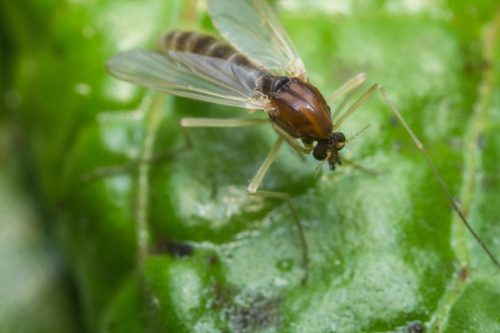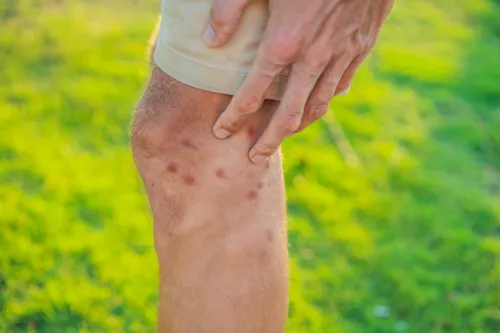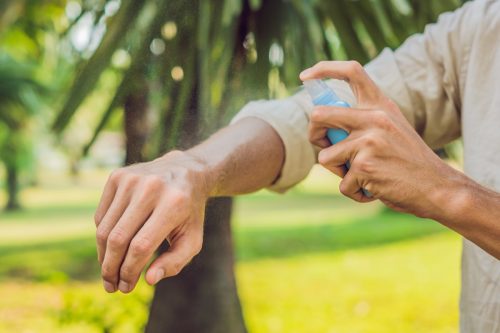Ulcer-Causing Skin Infection From Tropical Parasite Now Spreading in U.S., CDC Warns

We’re now fully immersed in fall—and while some of us are mourning warmer weather, there is one key benefit: fewer mosquitoes. But though you may be enjoying freedom from itchy bug bites until the summer rolls around again, the U.S. Centers for Disease Control and Prevention (CDC) just issued a warning about another kind of bite and leishmaniasis, a resultant ulcer-causing skin infection. Read on to find out why the CDC is warning about this growing problem.
RELATED: Widespread Bedbug Infestation Wreaks Havoc on Paris—Could It Happen Here?
These skin infections were once only a worry for international travelers.

Typically found in tropical and subtropical parts of the world, the sand fly can bite humans and transmit a parasite called Leishmania, according to the Cleveland Clinic. This parasite causes leishmaniasis, a skin infection that leads to skin ulcers or internal infections.
The CDC typically warns travelers about sand flies, even offering a list of destinations where they can be found. But now, doctors are detecting cases of leishmaniasis in Americans who say they haven’t traveled outside of the U.S., CNN reported.
RELATED: Virus-Carrying Mosquitoes Are Spreading in the U.S.—Experts Say Take These Precautions.
There are two common types of leishmaniasis.

As part of a new study—which is being being presented at the 2023 annual meeting of the American Society of Tropical Medicine and Hygiene this weekend—CDC medical epidemiologist Mary Kamb, MD, and her colleagues identified the parasite in patient tissue samples. Non-travelers who were infected with leishmaniasis all presented with visible ulcers, which typically show up near the sand fly bite, Kamb told CNN.
“People could be asymptomatic and not develop anything, but when people are symptomatic, they develop ulcers on their skin and sometimes it starts like a little tiny volcano with a crater in it,” Kamb said.
These kinds of leishmaniasis are cutaneous. According to the CDC, the variety being detected causes skin sores that change in size and appearance with time. The sores can also be closed bumps or lumps, or open like an ulcer, per the CDC.
The second common kind, visceral leishmaniasis, is an infection of the internal organs. Symptoms can take several months or a year to show up after a bite from an infected fly, but if visceral leishmaniasis is left untreated, it is fatal. You can get this kind when traveling to certain countries; however, it isn’t thought to be transmitted in the U.S.
RELATED: FDA Warns These 20+ Arthritis Meds Could Cause “Serious Side Effects.”
Sand flies that may carry Leishmania have been identified in several states.

The skin samples for the CDC study came from patients in Texas, which CNN notes is the only state that requires doctors to report leishmaniasis diagnoses. However, cases have also been reported in southeast Oklahoma, and sand flies that may have the parasite could also be in several other southwestern states.
Thanks to climate change, these flies have also been found farther north—in Delaware, Ohio, Maryland, and New Jersey—but CNN notes that it’s not known if flies in these states have transmitted infections.
In the study, most samples that tested positive were from participants who traveled internationally, but 86 were from people who hadn’t. The most common parasite species, Leishmania mexicana, has two genotypes, one of which was found in 94 percent of infected people who hadn’t traveled.
These findings suggest that in the U.S., this specific genotype, “CCC,” might be the one that’s endemic—or regularly occurring in a certain area. (It’s also worth noting that about six cases of leishmaniasis cases are reported in non-travelers in the U.S. annually, and while many Americans may not know much about leishmaniasis, the World Health Organization currently lists it as endemic here.)
Health officials have tips to stay safe.

As Gideon Wasserberg, PhD, professor of disease ecology and medical entomology at the University of North Carolina at Greensboro, told CNN, it’s thought that the parasite could be carried by rats. Sand flies are infected after biting the rats, and the flies then pass the parasite to humans. Wasserberg noted that people can’t typically transmit it to one another.
With this new information coming to light, Wasserberg stressed the importance of staying safe if you’re in a “warm, rural area.”
Officials note that sand flies are significantly smaller than mosquitoes. So, in areas where these pests are present, invest in window screens and netting for your bed that have smaller holes. These bugs can be repelled by bug sprays with DEET, so pick up an Environmental Protection Agency (EPA)-approved bug spray, too.
If you have a new skin sore that doesn’t go away after a bug bite, contact your doctor, Wasserberg said, per CNN. According to the Cleveland Clinic, leishmaniasis is “often curable when a provider diagnoses and treats it with medication right away.”
RELATED: For more up-to-date information, sign up for our daily newsletter.
Best Life offers the most up-to-date information from top experts, new research, and health agencies, but our content is not meant to be a substitute for professional guidance. When it comes to the medication you’re taking or any other health questions you have, always consult your healthcare provider directly.